“ExxonMobil has misled the public about climate change by telling the public one thing and then saying and doing the opposite behind closed doors..."

"... Our latest work shows that while their tactics have evolved from outright, blatant climate denial to more subtle forms of lobbying and propaganda, their end goal remains the same. And that’s to stop action on climate change.”
- Geoffrey Supran, Research Associate, Harvard University

Last year was the hottest year in history.
The heat grabbed on to the giant oceanic conveyor belt that takes warm water from the tropics up into the North Atlantic. That current is reaching a tipping point, say climate scientists, and threatens to change global weather dramatically in the coming decades.
Parts of Europe might see temperatures change by up to 30 degrees Celsius. Countries in the Southern Hemisphere could see increased warming, while the Amazon’s wet and dry seasons could flip, causing serious disruption to the ecosystem. Sea levels could surge by around one meter (one yard), changing the shorelines and altering weather even further.
This has happened before, when the ocean currents shut down some 12,000 years ago following rapid glacier melt. It is the entry of fresh water into the ocean that triggers the break-down in the belt. And climate change is melting the glaciers faster than ever before.
Humans caused this latest event.
Or, rather, a few humans. And that elite group consistently fought to cover up the consequences of their actions.
First things first: here is what they did:
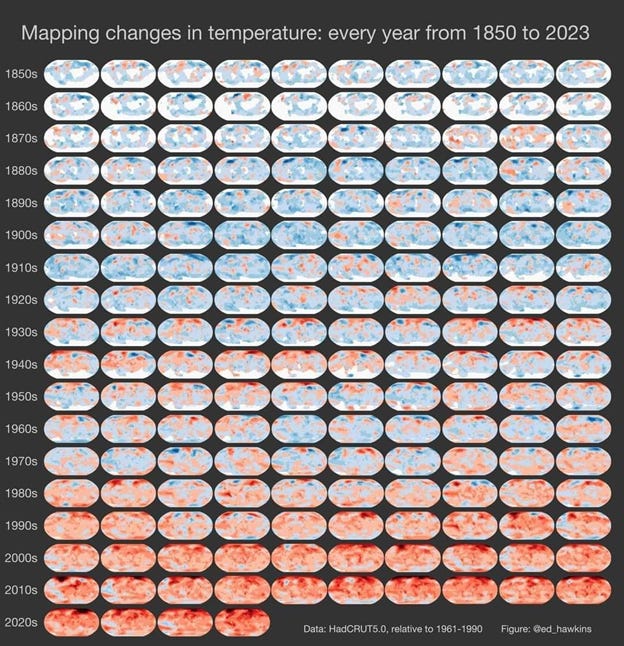
Source: NASA
The strong warming trend that started in the 1930s was largely due to greenhouse gas emissions caused by vehicles and factories. A one- or two-degree increase in global warming is significant because it takes a vast amount of heat to warm all of the oceans, the atmosphere, and the land masses by that much. In the past, a similar drop was all it took to plunge the Earth into the Little Ice Age. A five-degree drop was enough to bury a large part of North America under a towering mass of ice 20,000 years ago.
Now, weigh knowledge of that cause-and-effect against what the executives in the fossil fuel industry knew in that period.
The global fossil fuel cartel has an annual income of 28 trillion dollars.
With a sliver of that money, they launched studies that showed the environmental threat being caused by their industries.
They then knew that their profits would be affected if they had to pay the cost of the consequences of their actions affecting humanity and the environment.
They therefore had a choice: fix the problem or lie and misinform the public about the cost and nature of the Earth’s environmental loss.
The lie was easier.
The fossil-fuel companies gradually “evolved” their language, in the words of one ExxonMobil manager, from blatant climate denial to more subtle and insidious forms of ‘delayism’. Their strategies changed a bit over the decades but here is the basic outline of what they did:
Continuously created and promoted false climate change solutions or false progress illusion-building hopeful messages like “we are making progress,” “we are safe for now,” “the worst climate change consequences won’t happen until about 2100,” or “carbon capture or a new technology will save us in the future” in the global media.
Exxon has known that its products would likely cause dangerous global warming since at least the 1970s. By way of its trade association, the American Petroleum Institute, the oil industry as a whole has been on notice even longer — since the 1950s.
The Edison Electric Institute, a trade group that in 1991 helped create one of the first ever media campaigns designed to “directly attack the proponents of global warming,” according to internal documents.
The Center for Energy and Economic Development — an industry group which received at least $200,000 from the utility to spread pro-coal messages to the public. In 1994 and 1995, they collaborated on energy workshops that were broadcast across the US with Southern’s satellite technology. Hundreds of middle school and high school teachers attended.
“After the program,” reads a digital newsletter summarizing the event, “one government official who attended one of the sites was heard to exclaim, ‘I didn’t hear anything that would make me vote to spend any money on this problem [of global climate change].’”
An expense of $62.1-m is probably just a small snapshot of Southern Company’s denial funding too, the newsletter explains, because after 2005 Congress changed SEC filing requirements for utility holding companies “and the money trail largely faded”.
The cartel viciously attacked climate scientists, researchers, and qualified academics who dare to publish or speak accurate climate facts that disagreed with the cartel’s billions spent on climate disinformation.
World-renowned climate scientists like James Hansen have experienced decades of unwarranted harassment actions to ruin his reputation, defund his research, and cut off his paid public speaking events. Hansen strongly warned (and continues to warn) the public about the dangers of mass human suffering and the threat of human extinction caused by climate change.
The four biggest banks in America are the four biggest financiers of fossil fuel expansion in the world. These banks didn’t need Donald Trump’s help to sabotage the Paris climate accord: since 2015, they have provided well over $1-tn in lending and underwriting to the companies building new coal plants, pipelines, fracking wells, gas export terminals and more.
The carbon pollution these four US banks pour into the air via their fossil fuel financing is, in effect, redlining US cities and the world. The pollution affects low-lying Asian deltas in Bangladesh and Vietnam, and drought-afflicted African nations like Sudan. It ensures high asthma rates around Gulf coast refineries and unprecedented floods in places like Pakistan. Global temperature rise is systematically reducing the number of places where humans can thrive.
The cartel also paid freelance Internet posters or using AI comments to attack anti-cartel information or criticism of the cartel’s toxic, deadly products and actions. Their paid or AI role was and is to write personal attack posts to discredit the climate change information and whoever posted it. The attacks against accurate climate science and climate scientists are generally wild pseudo-science counter-opinions or sometimes even efforts to associate the posting or poster with extreme or despicable social or political ideas or organizations.
They emphasized uncertainty about whether the climate crises was real. Mobil and ExxonMobil ran one of the most comprehensive climate denial campaigns of all time, with a foray in the 1980s, a blitz in the 1990s and continued messaging through the late 2000s. Their climate “advertorials” — advertisements disguised as editorials — appeared in the op-ed page of the New York Times and other newspapers and were part of what scholars have called “the longest, regular (weekly) use of media to influence public and elite opinion in contemporary America”.
Between 1996 and 1998, for instance, Mobil ran 12 advertorials timed with the 1997 UN Kyoto negotiations that questioned whether the climate crisis is real and human-made and 10 that downplayed its seriousness. “Reset the alarm,” one ad suggested. “Let’s not rush to a decision at Kyoto … We still don’t know what role man-made greenhouse gases might play in warming the planet.”
They questioned the truth behind the climate change positions: “Exxon’s position”, instructed internal strategy memos from 1988–89, was to “extend the science” and “emphasize the uncertainty in scientific conclusions” about the climate crisis. Or as a 1998 “Action Plan” by Exxon, Chevron, API, utilities companies and others declared: “Victory will be achieved when average citizens” and the “media ‘understands’ (recognizes) uncertainties in climate science”.
ExxonMobil continued to fund climate denial through at least 2018. One of their 2004 advertorials claimed “scientific uncertainties” precluded “determinations regarding the human role in recent climate change”. That was untrue. Nine years earlier, the UN’s Intergovernmental Panel on Climate Change had concluded a “discernible human influence on global climate”. ExxonMobil’s chief climate scientist was acontributing author to the report.
They resorted to economic scaremongering. “Don’t risk our economic future,” said the Global Climate Coalition, a front group for utility, oil, coal, mining, railroad and car companies. This 1997 ad also targeted the Kyoto negotiations and was part of a $13m campaign that was so successful that the White House told GCC: President Bush “rejected Kyoto, in part, based on input from you”.
They issued warnings denying ‘massive’ climate-led extinction. Southern Company spent $62.1-million over the years to deny the impact of fossil fuel combustion on climate crisis. A 1991 memo by Informed Citizens for the Environment made that strategy explicit: “Reposition global warming as theory (not fact).”
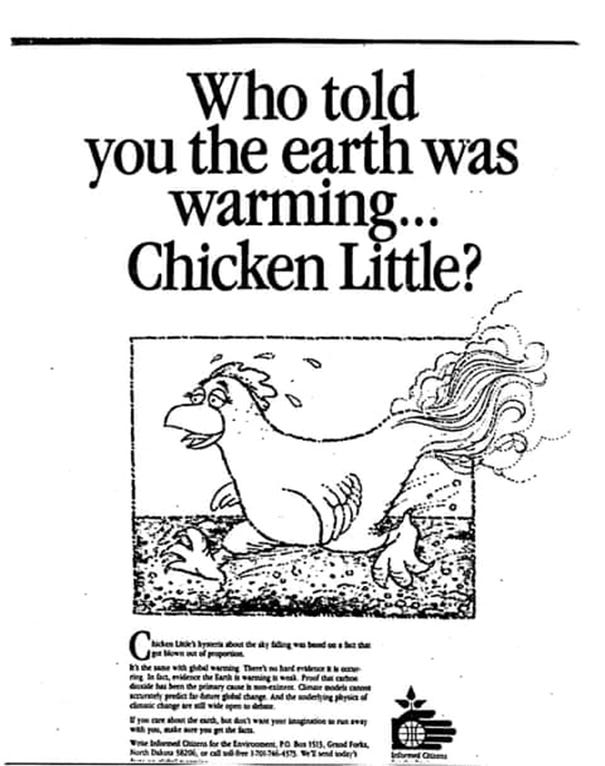
The companies knew their ads were wrong. In 1980, a report circulated to a division of one of the biggest coal-burning utilities in the US warned that “fossil fuel combustion” was rapidly warming the atmosphere and could cause a “massive extinction of plant and animal species” along with a “5 to 6-meter rise in sea level” across the world. Several years later an official at the utility co-chaired a conference where scientific researchers fretted that “as we continue to exploit the vast deposits of fossil fuels” it could cause “disruptive climate changes”.
Not only did Southern Company fail to adjust its business model towards cleaner energy sources, it began paying for print advertisements saying climate change was not real. “Who told you the earth was warming,” asks one ad from 1991.
Major oil and gas producers are now (2022) being sued in more than 20 US jurisdictions for running campaigns to deceive the public about climate change while internally acknowledging the risks of burning fossil fuels. And the new report suggests that coal-burning electric utilities like Southern Company, which were also warnedabout climate change for decades, could be sued next.
The money went to law firms, public relations companies, industry groups and right-wing thinktanks that have at some point disputed the scientific consensus for climate change or attacked legislative solutions that could transition the US economy away from its dependance on fossil fuels.
Exxon, by comparison, paid over $33m to such groups over a period of 18 years.
Because of the global fossil fuel cartel’s highly successful disinformation and other undue influence tactics, almost everything you’ve heard for decades in the media, from the IPCC, from your government, or nearly ALL environmental groups about climate change has been underestimated by about 30 to 60%, according to environmental non-profit climate change think tank Job One For Humanity.
Job One provides a link which outlines the many ways in which the global fossil fuel cartel has grossly distorted and manipulated almost all of the information you are receiving about climate change.
Because of the cartel’s actions, we have lost 40 -60 years when fossil fuel reductions could have been made gradually and easily managed by our governments.
In those decades we lost time when we could have gradually reduced global fossil fuel use. If we had started and done what was needed six decades ago, we would not be in an accelerating global climate change emergency today with many now unavoidablecatastrophic consequences.
This was time for essential and adequate climate change emergency preparation, adaptation, and resilience-building to manage and survive the many cartel-created and now unavoidable climate change consequences.
Now we face a situation where everything we have been told about climate change consequences will actually be 30–60% worse than they are telling you, and will occur 30–60% sooner.
In a word, every fossil fuel reduction target date and target amount they tell you that is the correct required amount for global fossil fuel use reduction will be 30–60% too little and have a deadline at least 30–60% too late to keep humanity safe and not facing mass extinction.
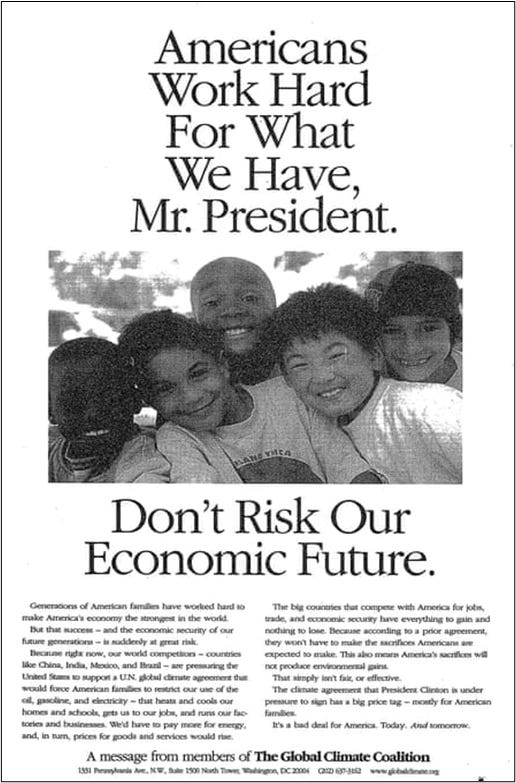
They decided to put “emphasis on costs/political realities”, instructed a 1989 Exxon strategy memo. Just as the fossil fuel industry funded contrarian scientists to deny climate science, it also touted the flawed economic analyses of industry-funded economists.
The best predictors of fossil fuel industry ad spending are media scrutiny and political activity. Today, economic scaremongering has gone digital, with huge spikes in television and social media ad spending by oil lobbies each time climate regulations loom. In the runup to the 2018–20 US midterm and presidential elections, ExxonMobil spent more on political advertising on Facebook and Instagram than any other company in the world (except Facebook itself).
Big oil’s rhetoric has evolved from outright denial to more subtle forms of propaganda, including shifting responsibility away from companies and on to consumers. This mimics big tobacco’s effort to combat criticism and defend against litigation and regulation by “casting itself as a kind of neutral innocent, buffeted by the forces of consumer demand”.
They cast the consumer as the problem: It’s not our fault, it’s yours
From 2004 to 2006, a $100m-plus a year BP marketing campaign “introduced the idea of a ‘carbon footprint’ before it was a common buzzword”, according to the PR agent in charge of the campaign. The targets of this campaign were the “routine human activities” and “lifestyle choices” of “individuals” and the “average American household”. In 2019, BP ran a new “Know your carbon footprint” campaign on social media.
The very notion of a personal carbon footprint — a concept that’s completely ubiquitous in discussions about personal responsibility — was first popularized by BP as part of a $100 million per year marketing campaign between 2004 and 2006.
Greenwashing is common, where they talk clean, act dirty.
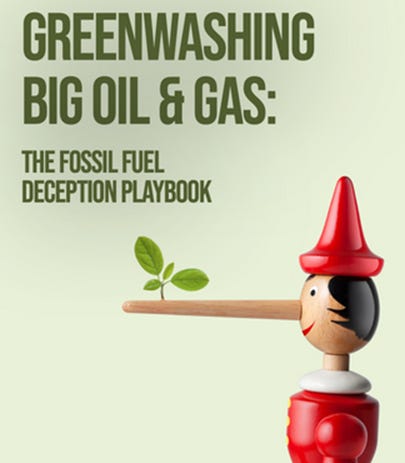
Report Source
“We’re partnering with major universities to develop the next generation of biofuels,” said Chevron in 2007. This is also a top talking point of BP, ExxonMobil and others.
ExxonMobil has been trumpeting its research into algae biofuels for more than a decade — from black-and-white print ads (2009) to digital commercials (2018–21).
Greenwashing confers companies with an aura of environmental credibility while distracting from their anti-science, anti-clean energy disinformation, lobbying and investments. The goal is to defend what BP calls a company’s “social license to operate”.
One way fossil fuel companies give themselves a green sheen is to establish — then boast about — what a 1998 API strategy memo termed “cooperative relationships” with reputable academic institutions. Big oil’s colonization of academia is pervasive. Shell’s ongoing sponsorship of the London Science Museum’s climate exhibition comes with a gagging clause prohibiting the museum from discrediting the company’s reputation.
As for algae: America’s five largest oil and gas companies spent $3.6bn on corporate reputation advertising between 1986 and 2015. ExxonMobil has spent more on advertising than on algae research.
BP “developed an ‘all of the above’ strategy” for marketing energy from 2006 to 2008, “before any presidential candidates spoke of the same”, according to BP’s PR lead.
Big oil continues to promote this narrative of “fossil fuel solution-ism’, including its “all of the above” language, on social media, in Congress and in paid-for, pretend editorials in the Washington Post. To make this spin stick, fossil fuel companies have been calling methane “clean” since at least the 1980s. “Natural gas is already clean,” said API Facebook ads and billboards last year.
In contradiction to the science of stopping global heating, big oil asserts that fossil fuels will be essential for the foreseeable future. The “all of the above” energy mantra was — as BP’s advertising creative put it — “co-opted by politicians in 2008” and became a centerpiece of the Obama administration’s energy policies. The campaign also positioned methane as a “clean bridge” fuel.
Like “clean coal”, calling methane “clean”, “cleanest” or “low-carbon” has been deemed false advertising by regulators.
Between 2010 and 2018, 98.7% of Shell’s investments were in oil and gas. Such misrepresentations are industry-wide. Today, we’re all inundated with ads that leverage a combination of narratives, including those illustrated above, to present fossil fuel companies as climate saviors.
The polluting infrastructure these companies set up is designed to last decades — long past the point at which science tells us we need to wean off fossil fuels. We can’t shut off all oil and gas overnight, but we can, and must, call on these banks to keep it from expanding, to move money out of dirty energy projects and finance more clean energy instead.
It’s entirely clear who is hit the hardest by the impacts of the climate crisis. Both in the US and around the world, the poorest and most vulnerable people disproportionately suffer the effects of a warming planet, despite having done the least to cause it.
Just like cigarette-smoking, fossil fuels have significant impacts on health: air pollution from the burning of fossil fuels is one of the leading causes of premature mortality, and children who live in homes with gas stoves have similar risk of asthma as children living with a smoker. Fossil fuels also cause climate change, which affects health through heat waves, food insecurity, respiratory problems from wildfire smoke, increased infectious diseases from pests, disruptions to healthcare infrastructure and services and more. These impacts will only increase as climate change worsens.
In Canada an organization called the Canadian Association of Physicians for the Environment (CAPE) is calling for a ban on all fossil fuel advertising in the name of public and planetary health.
CAPE helped lead a campaign against tobacco use, and it says that fossil fuels are an even more serious public threat. CAPE is supported by a broad coalition of Canadian health, environmental, parent, and cultural groups. It joins other campaigns around the world targeting fossil fuel ads, which have led to successful bans in Amsterdamand France.
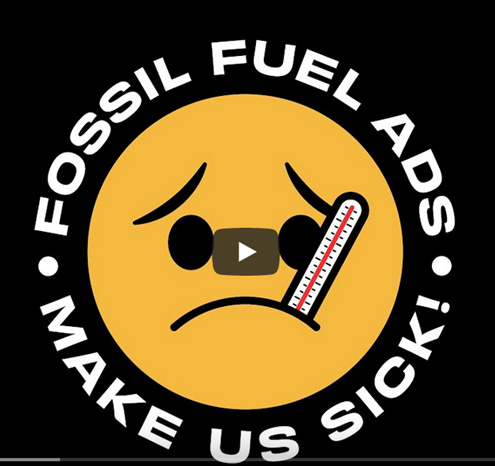
You wonder what their ‘exit strategy’ was supposed to be, once their lies were revealed. The guilty companies had to know that at some point they would be caught; that their actions would show up on the gauges around the world. Was it enough for them that they were able to delay action on diminishing their profits for another few years? That their shareholders could continue to afford air conditioning as the planet warmed up?
What was their plan for the moment the lights turned on and the climate crime scene was visible?
Because that moment has arrived.
Now these companies will be sued and regulated in a way that has never been seen before in the history of capitalism.
Economies have never been “free”; have always been a framework of rules set by competing social interests. We have just gone through a multi-decade period of owner-driven economics, where the wealthiest percentile has augmented its position by tuning the laws against the rest.
Now there is the emerging shock of climate change, and the rich have no place to hide.
The decades of deception are ending with the realization that companies need to be tightly regulated by the public sector; that Milton Friedman’s “shareholder value” measure of an economy is a disaster for everyone.
The US grew fastest when it was putting more of its wealth into programs like education and healthcare that raised everyone above the level of comparable societies around the world. Public infrastructure like roads, communications and support for the poor are investments that are more valuable than the self-centered profit-making for the few.
The Deception Decades may turn out to be an historic ramp-up period before a major change, akin to British North America before the Stamp Act drove people to start demanding a voice in their affairs.
The coming years will tell whether the Deception Decades herald a revolution in public decision-making about the economy.
According to Job One Executive Director Lawrence Wollersheim, “The global fossil fuel cartel will someday be forced into court and tried for its many criminal activities destroying the future of humanity. There is already an online mock trial of the cartel here (https://www.joboneforhumanity.org/fossil_fuel_cartel_trial } laying out the cartel’s 60 years of crimes against humanity.”
There was a time when a physicist rose from the audience in a self-congratulatory oil industry conference with a warning. Edward Teller — of Manhattan Project fame — warned that combustion was having a “greenhouse effect” that threatened the world: “I think that this chemical contamination is more serious than most people tend to believe.”
When the guy who led the development of the hydrogen bomb tells you something is a threat, surely you would listen.
But no one did.
And now one thing is certain: a social blow-back is coming.
It will be at least as fierce in our political edifices as are the climate-change induced storms racking our shores.
They have gone too far.
They must has felt immortal in their high-rise headquarters with their profits pouring in. They could look down at the streets where the cars were belching fumes into the air.
Not their problem.
But it is.
Now it very much is their problem.
And they will pay for it.
There was a time when other “Ordinary Men” did hideous things and — regrettably — were not called on to pay for it. Reserve Police Battalion 101 of the German Order Police was a group of 500 policemen, most of them from Hamburg, that was made up of truly ordinary men. Most were in their 30’s and 40’s — too old for conscription into the army — and of middle- or lower-class origins. They included men who, before the war, had been professional policemen as well as businessmen, dockworkers, truck drivers, construction workers, machine operators, waiters, druggists and teachers. In 1942 they were sent to central Poland with instructions to kill all the Jews. This they did. Their battalion commander, Major Wilhelm Trapp, a 53-year-old career policeman, found the orders distasteful. He spent his time away from the killing. His driver once heard him say: “If this Jewish business is ever avenged on earth, then have mercy on us Germans.”
Now the time is coming for the people in the fossil fuel industry who created a disastrous outrage. They have been killing us all.
We will be avenged.
And society will be revolutionized.
But we will leave a livable world.
Something unlike what the cartel had in mind for us throughout the Deception Decades.

Written by Barry Gander
A Canadian from Connecticut: 2 strikes against me! I'm a top writer, looking for the Meaning under the headlines. Follow me on Mastodon @Barry
To help do something about the climate change and global warming emergency, click here.
Sign up for our free Global Warming Blog by clicking here. (In your email, you will receive critical news, research, and the warning signs for the next global warming disaster.)
To share this blog post: Go to the Share button to the left below.

Showing 3 reactions
Sign in with